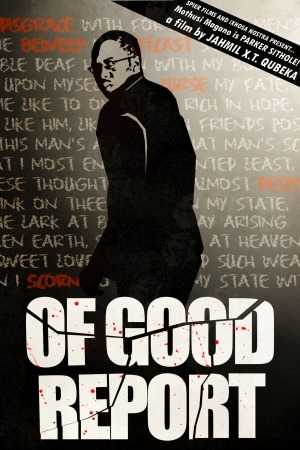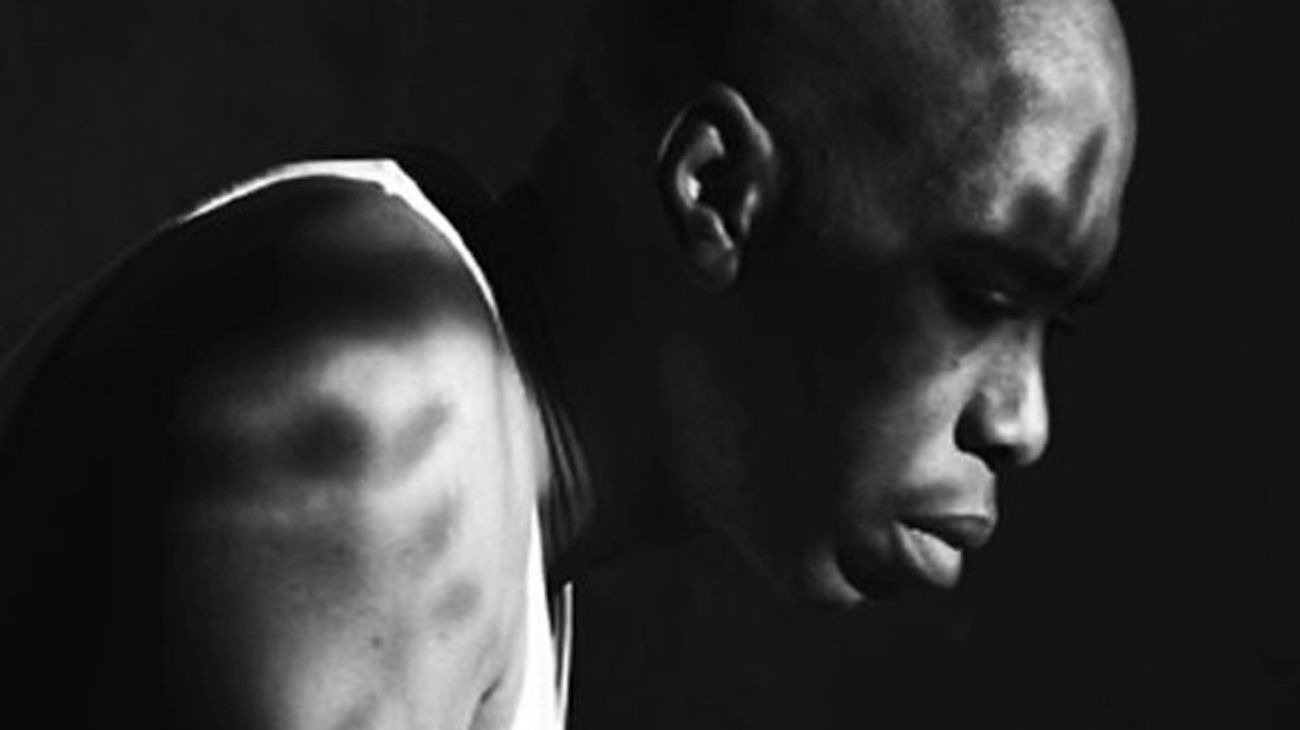
The 49th Chicago International Film Festival
Screens at CIFF: 10/17 & 10/19 & 10/20
World premiere: 9 August, 2013, South Africa
The ability to completely discombobulate the audience is one that any good thriller-make should count among their skills, and with Of Good Report, director Jahmil X.T. Qubanka proves that he has that down cold. Lord knows it's not the first film that has tricked us into feeling sympathy for a painfully awkward nice guy and then pull the rug out midway through and inform us that this whole time, we've been rooting for a psycho, but there's something about the particular way that the ingredients are assembled here that makes it an unusually gripping example of the form. The film itself has problems in a lot of ways - none that are very big and certainly none that are film-breaking, but enough of them to cool one's enthusiasm for the whole distinctly - but the one thing it does perfectly, I believe, is getting us positioned tightly in its coils unawares, and squeezing.
The man in question is Parker Sithole (Mothusi Magano), first introduced in one of those disconcerting opening scenes that's obviously from later in the movie, so just sit tight and we'll get back here and everything will make sense. I'm really starting the hate the living daylights out of that trend. When we flash back an unspecified period of time, Sithole has just started working as a professor of English at a high school in South Africa, being so silent and shy that it's kind of astonishing that he's able to communicate any ideas to his students at all. He also lives in a metal shack operated by an impatient, sharp-tongued landlady (Nomhlé Nkyonyeni), who clearly doesn't trust something about him.
That there is darkness in him is easy enough to spot from the way that he clouds over when his unspecific past in the military is mentioned; but that's got nothing on what happens when he starts becoming a little too friendly with one of his students, a 16-year-old girl suggestively named Nolitha (Petronella Tshuma). Just like that, this very sad, strained man that we've been drawn to pity steps over the line to start sleeping with his student - I don't know if it counts as statutory rape in South Africa, but the ethical issues know no national boundaries - and things start to go terribly far south as she grows a little obsessed with him, and he grows a lot obsessed with her, and then as will always happen in dramatic stories like this, a pregnancy arrives. So far, so melodramatic, but it's not until after Nolitha undergoes a traumatic abortion and tries to get back to a normal life that the true depths to which Sithole can and will sink in pursuit of his lusts become revealed. Spoiler: very deep depths.
I don't think I'm claiming more than the film can support if I suggest that one of the things it does best, after tricking us into feeling sorry for Sithole and then keeping us on the hook for his horrifying actions, is impugning the overweening male privilege that got us there. There are many first-person shots from Sithole's perspective in this movie, including the very first one, and these I cannot explain unless it's that we're being obliged to yoke our perspective to his own in order to make us uncomfortable aware of how he sees the world. And his way of seeing the world is one that, not to put a fine point on it, objectifies women, not as sexual playthings but as something weird and inexplicable and other. Indeed, more women in the film are confusing if not outright terrifying to Sithole than sexually arousing. It's almost like a parody of male gaze, and certainly a condemnation of it, made particularly clear in the last third of the movie when any lingering suspicion that we're meant to identify with Sithole is wiped away by the sheer accumulation of horrors he perpetrates: we're forced to identify with him, but it's not something that is likely to make any of us feel very good, and I suspect that Qubanka does this on purpose, calling attention to how much evil Sithole can get away with because our natural inclination to let men get away with it gives people like that power.
Probably best not to make too much of the film's politics, though, for mostly, it wants to be a harsh and nasty thriller, and by all means, it's a good one. Magano plays meekness and neuroses tremendously well, managing to seem both pathetic and threatening as hell with such tiny shifts of emphasis that you can't even quite identify what he's doing differently; it makes for a genuinely involving and unpredictable character, one that the director and actor keep just distant enough that we can figure him out, thus normalising him thus making him someone we don't need to be terrified. We do, in fact, need to be very terrified of this man, and it's a real credit to the artists that this film is so tense and disturbing despite being made on an obvious shoestring, and despite a cast that, outside of Magano, certainly doesn't err on the side of great performances. Honestly, the further we get from the central character, the thinner the thing becomes: a little washed-out, a little over-emphasised.
But where it counts, it hits hard, and it's unforgiving. This isn't a masterpiece for Qubanka, but it's enough to suggest that a masterpiece is within him, somewhere, and I for one look forward very much to seeing where he goes from here.
7/10
World premiere: 9 August, 2013, South Africa
The ability to completely discombobulate the audience is one that any good thriller-make should count among their skills, and with Of Good Report, director Jahmil X.T. Qubanka proves that he has that down cold. Lord knows it's not the first film that has tricked us into feeling sympathy for a painfully awkward nice guy and then pull the rug out midway through and inform us that this whole time, we've been rooting for a psycho, but there's something about the particular way that the ingredients are assembled here that makes it an unusually gripping example of the form. The film itself has problems in a lot of ways - none that are very big and certainly none that are film-breaking, but enough of them to cool one's enthusiasm for the whole distinctly - but the one thing it does perfectly, I believe, is getting us positioned tightly in its coils unawares, and squeezing.
The man in question is Parker Sithole (Mothusi Magano), first introduced in one of those disconcerting opening scenes that's obviously from later in the movie, so just sit tight and we'll get back here and everything will make sense. I'm really starting the hate the living daylights out of that trend. When we flash back an unspecified period of time, Sithole has just started working as a professor of English at a high school in South Africa, being so silent and shy that it's kind of astonishing that he's able to communicate any ideas to his students at all. He also lives in a metal shack operated by an impatient, sharp-tongued landlady (Nomhlé Nkyonyeni), who clearly doesn't trust something about him.
That there is darkness in him is easy enough to spot from the way that he clouds over when his unspecific past in the military is mentioned; but that's got nothing on what happens when he starts becoming a little too friendly with one of his students, a 16-year-old girl suggestively named Nolitha (Petronella Tshuma). Just like that, this very sad, strained man that we've been drawn to pity steps over the line to start sleeping with his student - I don't know if it counts as statutory rape in South Africa, but the ethical issues know no national boundaries - and things start to go terribly far south as she grows a little obsessed with him, and he grows a lot obsessed with her, and then as will always happen in dramatic stories like this, a pregnancy arrives. So far, so melodramatic, but it's not until after Nolitha undergoes a traumatic abortion and tries to get back to a normal life that the true depths to which Sithole can and will sink in pursuit of his lusts become revealed. Spoiler: very deep depths.
I don't think I'm claiming more than the film can support if I suggest that one of the things it does best, after tricking us into feeling sorry for Sithole and then keeping us on the hook for his horrifying actions, is impugning the overweening male privilege that got us there. There are many first-person shots from Sithole's perspective in this movie, including the very first one, and these I cannot explain unless it's that we're being obliged to yoke our perspective to his own in order to make us uncomfortable aware of how he sees the world. And his way of seeing the world is one that, not to put a fine point on it, objectifies women, not as sexual playthings but as something weird and inexplicable and other. Indeed, more women in the film are confusing if not outright terrifying to Sithole than sexually arousing. It's almost like a parody of male gaze, and certainly a condemnation of it, made particularly clear in the last third of the movie when any lingering suspicion that we're meant to identify with Sithole is wiped away by the sheer accumulation of horrors he perpetrates: we're forced to identify with him, but it's not something that is likely to make any of us feel very good, and I suspect that Qubanka does this on purpose, calling attention to how much evil Sithole can get away with because our natural inclination to let men get away with it gives people like that power.
Probably best not to make too much of the film's politics, though, for mostly, it wants to be a harsh and nasty thriller, and by all means, it's a good one. Magano plays meekness and neuroses tremendously well, managing to seem both pathetic and threatening as hell with such tiny shifts of emphasis that you can't even quite identify what he's doing differently; it makes for a genuinely involving and unpredictable character, one that the director and actor keep just distant enough that we can figure him out, thus normalising him thus making him someone we don't need to be terrified. We do, in fact, need to be very terrified of this man, and it's a real credit to the artists that this film is so tense and disturbing despite being made on an obvious shoestring, and despite a cast that, outside of Magano, certainly doesn't err on the side of great performances. Honestly, the further we get from the central character, the thinner the thing becomes: a little washed-out, a little over-emphasised.
But where it counts, it hits hard, and it's unforgiving. This isn't a masterpiece for Qubanka, but it's enough to suggest that a masterpiece is within him, somewhere, and I for one look forward very much to seeing where he goes from here.
7/10
Categories: african cinema, crime pictures, thrillers, violence and gore






